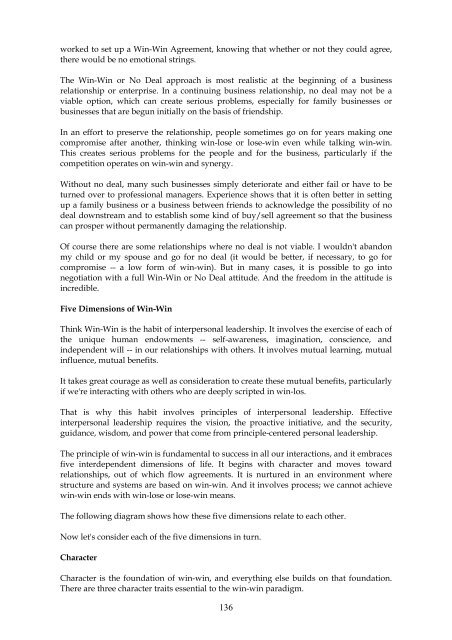Covey - The 7 habits of highly effective people
Create successful ePaper yourself
Turn your PDF publications into a flip-book with our unique Google optimized e-Paper software.
worked to set up a Win-Win Agreement, knowing that whether or not they could agree,<br />
there would be no emotional strings.<br />
<strong>The</strong> Win-Win or No Deal approach is most realistic at the beginning <strong>of</strong> a business<br />
relationship or enterprise. In a continuing business relationship, no deal may not be a<br />
viable option, which can create serious problems, especially for family businesses or<br />
businesses that are begun initially on the basis <strong>of</strong> friendship.<br />
In an effort to preserve the relationship, <strong>people</strong> sometimes go on for years making one<br />
compromise after another, thinking win-lose or lose-win even while talking win-win.<br />
This creates serious problems for the <strong>people</strong> and for the business, particularly if the<br />
competition operates on win-win and synergy.<br />
Without no deal, many such businesses simply deteriorate and either fail or have to be<br />
turned over to pr<strong>of</strong>essional managers. Experience shows that it is <strong>of</strong>ten better in setting<br />
up a family business or a business between friends to acknowledge the possibility <strong>of</strong> no<br />
deal downstream and to establish some kind <strong>of</strong> buy/sell agreement so that the business<br />
can prosper without permanently damaging the relationship.<br />
Of course there are some relationships where no deal is not viable. I wouldn't abandon<br />
my child or my spouse and go for no deal (it would be better, if necessary, to go for<br />
compromise -- a low form <strong>of</strong> win-win). But in many cases, it is possible to go into<br />
negotiation with a full Win-Win or No Deal attitude. And the freedom in the attitude is<br />
incredible.<br />
Five Dimensions <strong>of</strong> Win-Win<br />
Think Win-Win is the habit <strong>of</strong> interpersonal leadership. It involves the exercise <strong>of</strong> each <strong>of</strong><br />
the unique human endowments -- self-awareness, imagination, conscience, and<br />
independent will -- in our relationships with others. It involves mutual learning, mutual<br />
influence, mutual benefits.<br />
It takes great courage as well as consideration to create these mutual benefits, particularly<br />
if we're interacting with others who are deeply scripted in win-los.<br />
That is why this habit involves principles <strong>of</strong> interpersonal leadership. Effective<br />
interpersonal leadership requires the vision, the proactive initiative, and the security,<br />
guidance, wisdom, and power that come from principle-centered personal leadership.<br />
<strong>The</strong> principle <strong>of</strong> win-win is fundamental to success in all our interactions, and it embraces<br />
five interdependent dimensions <strong>of</strong> life. It begins with character and moves toward<br />
relationships, out <strong>of</strong> which flow agreements. It is nurtured in an environment where<br />
structure and systems are based on win-win. And it involves process; we cannot achieve<br />
win-win ends with win-lose or lose-win means.<br />
<strong>The</strong> following diagram shows how these five dimensions relate to each other.<br />
Now let's consider each <strong>of</strong> the five dimensions in turn.<br />
Character<br />
Character is the foundation <strong>of</strong> win-win, and everything else builds on that foundation.<br />
<strong>The</strong>re are three character traits essential to the win-win paradigm.<br />
136


